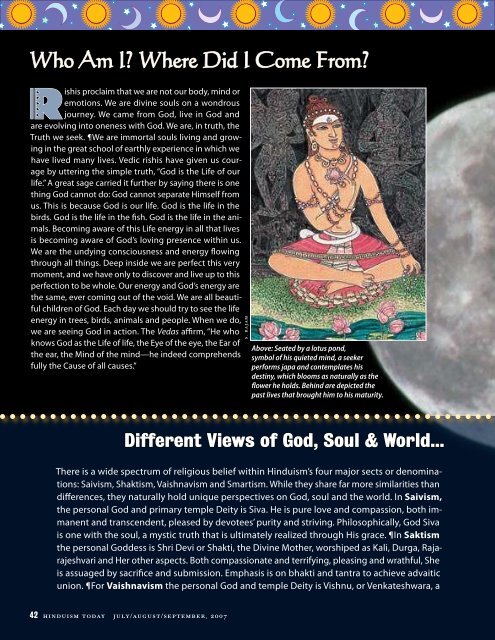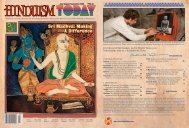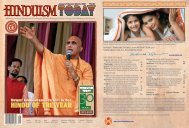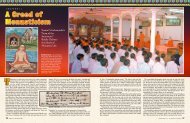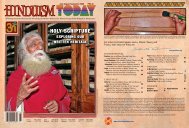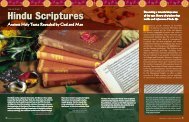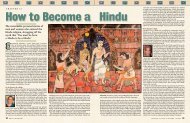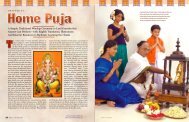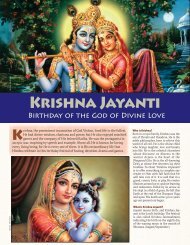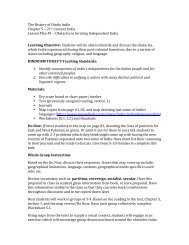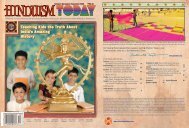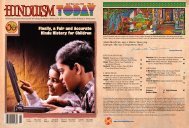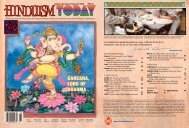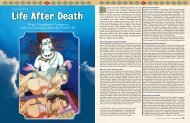Hinduism Today July 2007 - Cover, Index, Gatefold, Front Articles
Hinduism Today July 2007 - Cover, Index, Gatefold, Front Articles
Hinduism Today July 2007 - Cover, Index, Gatefold, Front Articles
Create successful ePaper yourself
Turn your PDF publications into a flip-book with our unique Google optimized e-Paper software.
Who Am I? Where Did I Come From?<br />
Where Am I Going? What Is My Path?<br />
Rishis proclaim that we are not our body, mind or<br />
emotions. We are divine souls on a wondrous<br />
journey. We came from God, live in God and<br />
are evolving into oneness with God. We are, in truth, the<br />
Truth we seek. We are immortal souls living and growing<br />
in the great school of earthly experience in which we<br />
have lived many lives. Vedic rishis have given us courage<br />
by uttering the simple truth, “God is the Life of our<br />
life.” A great sage carried it further by saying there is one<br />
thing God cannot do: God cannot separate Himself from<br />
us. This is because God is our life. God is the life in the<br />
birds. God is the life in the fish. God is the life in the animals.<br />
Becoming aware of this Life energy in all that lives<br />
is becoming aware of God’s loving presence within us.<br />
We are the undying consciousness and energy flowing<br />
through all things. Deep inside we are perfect this very<br />
moment, and we have only to discover and live up to this<br />
perfection to be whole. Our energy and God’s energy are<br />
the same, ever coming out of the void. We are all beautiful<br />
children of God. Each day we should try to see the life<br />
energy in trees, birds, animals and people. When we do,<br />
we are seeing God in action. The Vedas affirm, “He who<br />
knows God as the Life of life, the Eye of the eye, the Ear of<br />
the ear, the Mind of the mind—he indeed comprehends<br />
fully the Cause of all causes.”<br />
s. rajam<br />
Above: Seated by a lotus pond,<br />
symbol of his quieted mind, a seeker<br />
performs japa and contemplates his<br />
destiny, which blooms as naturally as the<br />
flower he holds. Behind are depicted the<br />
past lives that brought him to his maturity.<br />
Above, an aspirant climbs the highest<br />
peak of all, the summit of consciousness.<br />
Though the higher reaches of this path<br />
are arduous, solitary, even severe, he<br />
remains undaunted, impervious to<br />
distraction, his eyes fixed firmly on<br />
the goal—Self Realization.<br />
s. rajam<br />
We are all growing toward God, and experience<br />
is the path. Through experience we mature<br />
out of fear into fearlessness, out of anger into<br />
love, out of conflict into peace, out of darkness into light<br />
and union in God. We have taken birth in a physical<br />
body to grow and evolve into our divine potential. We<br />
are inwardly already one with God. Our religion contains<br />
the knowledge of how to realize this oneness and not<br />
create unwanted experiences along the way. The peerless<br />
path is following the way of our spiritual forefathers,<br />
discovering the mystical meaning of the scriptures. The<br />
peerless path is commitment, study, discipline, practice<br />
and the maturing of yoga into wisdom. In the beginning<br />
stages, we suffer until we learn. Learning leads us to<br />
service; and selfless service is the beginning of spiritual<br />
striving. Service leads us to understanding. Understanding<br />
leads us to meditate deeply and without distractions.<br />
Finally, meditation leads us to surrender in God. This is<br />
the straight and certain path, the San Marga, leading to<br />
Self Realization—the inmost purpose of life—and subsequently<br />
to moksha, freedom from rebirth. The Vedas<br />
wisely affirm, “By austerity, goodness is obtained. From<br />
goodness, understanding is reached. From understanding,<br />
the Self is obtained, and he who obtains the Self is<br />
freed from the cycle of birth and death.”<br />
Different Views of God, Soul & World…<br />
There is a wide spectrum of religious belief within <strong>Hinduism</strong>’s four major sects or denominations:<br />
Saivism, Shaktism, Vaishnavism and Smartism. While they share far more similarities than<br />
differences, they naturally hold unique perspectives on God, soul and the world. In Saivism,<br />
the personal God and primary temple Deity is Siva. He is pure love and compassion, both immanent<br />
and transcendent, pleased by devotees’ purity and striving. Philosophically, God Siva<br />
is one with the soul, a mystic truth that is ultimately realized through His grace. In Saktism<br />
the personal Goddess is Shri Devi or Shakti, the Divine Mother, worshiped as Kali, Durga, Rajarajeshvari<br />
and Her other aspects. Both compassionate and terrifying, pleasing and wrathful, She<br />
is assuaged by sacrifice and submission. Emphasis is on bhakti and tantra to achieve advaitic<br />
union. For Vaishnavism the personal God and temple Deity is Vishnu, or Venkateshwara, a<br />
from <strong>Hinduism</strong>’s Four Denominations<br />
loving and beautiful Lord pleased by service and surrender, and His incarnations, especially Rama<br />
and Krishna. Among the foremost means of communion is chanting His holy names. In most schools<br />
of Vaishnavism, God and soul are eternally distinct, with the soul’s destiny being to revel in God’s<br />
loving presence. In Smartism, the Deity is Ishvara. Devotees choose their Deity from among six<br />
Gods, yet worship the other five as well: Vishnu, Siva, Shakti, Ganesha, Surya and Skanda. Ishvara<br />
appears as a human-like Deity according to devotees’ loving worship. Both God and man are, in reality,<br />
the Absolute, Brahman; though under the spell of maya, they appear as two. Jnana, enlightened<br />
wisdom, dispels the illusion. In this Insight, along the lower section of the next four pages, you<br />
will find verses from the writings of seers of these four denominations that offer a glimpse of their<br />
perspectives on the nature of things ultimate.<br />
42 hinduism today july/august/september, <strong>2007</strong><br />
j u ly / au g u s t / s e p t e m b e r , 2 0 0 7 h i n d u i s m t o d ay 43


